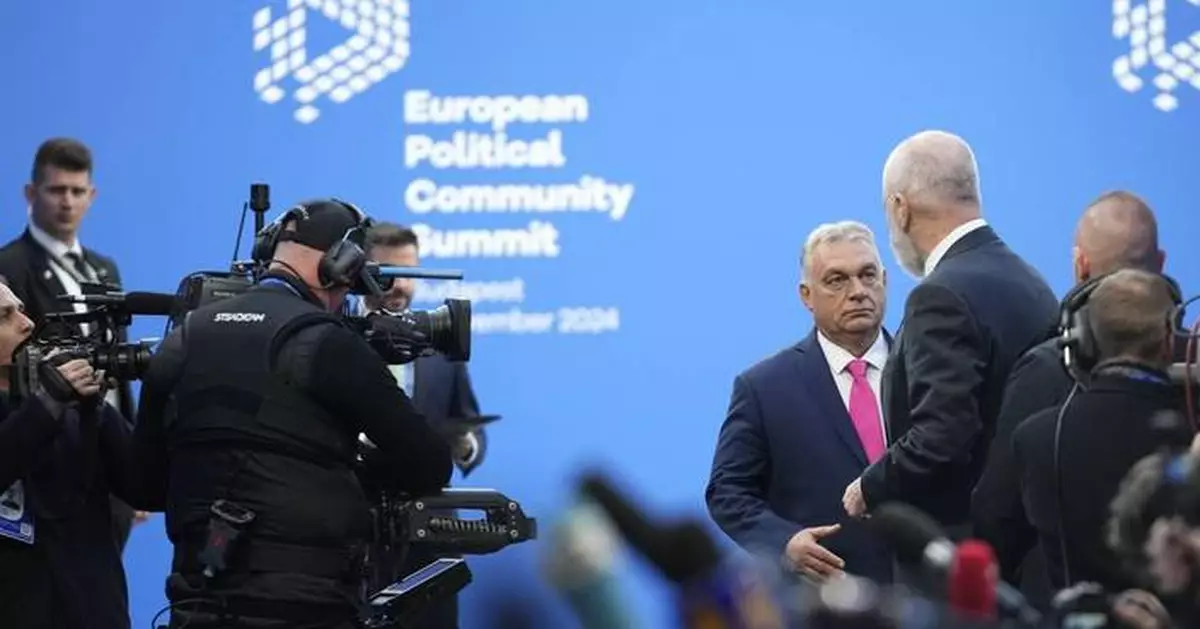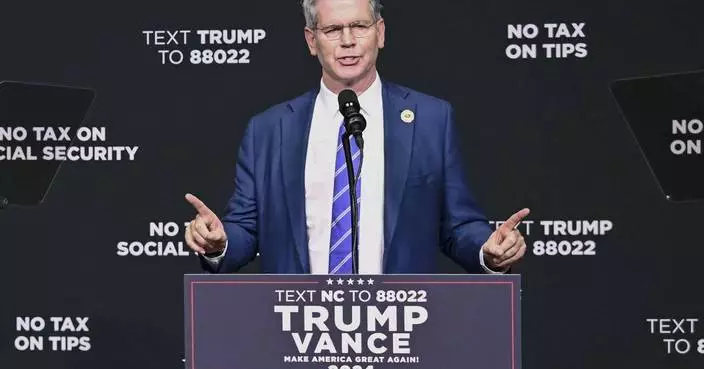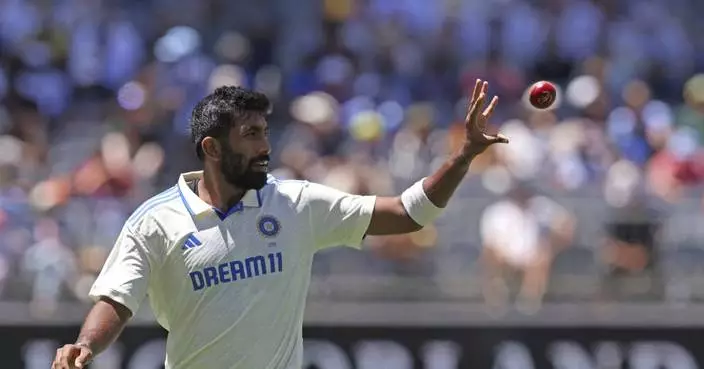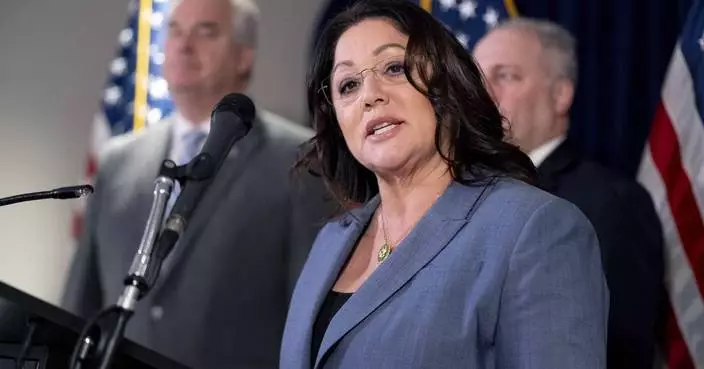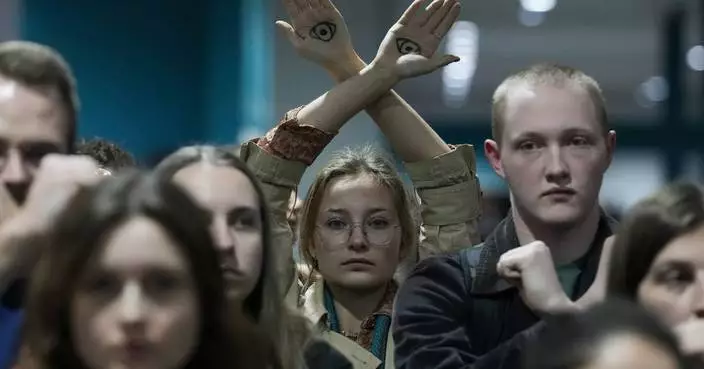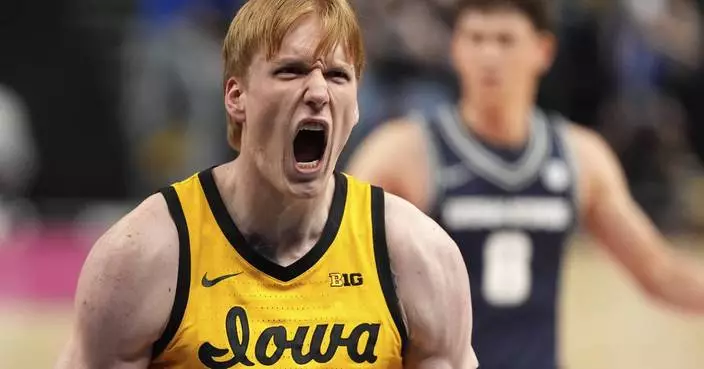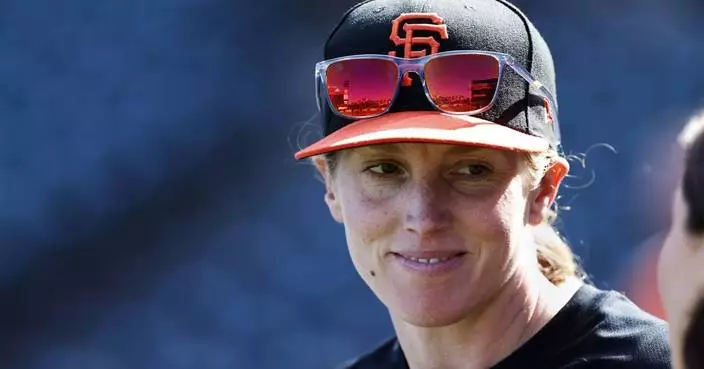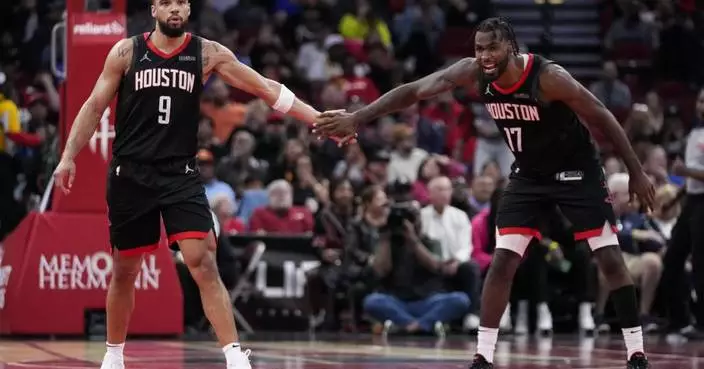BUDAPEST, Hungary (AP) — Around 50 European leaders on Thursday called for a stronger defense posture across the continent that no longer necessitates a fundamental dependence on Washington as they gave a guarded welcome to U.S. President-elect Donald Trump.
Ukrainian President Volodymyr Zelenskyy, who spoke to Trump after the election result, also had warm words to say about him. However, he took issue with the incoming president's assertion that Russia's war with Ukraine could be ended in a day.
Click to Gallery
Ukraine's President Volodymyr Zelenskyy speaks during a press conference during the European Political Community (EPC) Summit at the Puskas Arena in Budapest , Hungary, Thursday, Nov. 7, 2024. (AP Photo/Denes Erdos)
Ukraine's President Volodymyr Zelenskyy speaks during a press conference during the European Political Community (EPC) Summit at the Puskas Arena in Budapest , Hungary, Thursday, Nov. 7, 2024. (AP Photo/Denes Erdos)
Hungary's Prime Minister Viktor Orban gestures during a press conference during the European Political Community (EPC) Summit at the Puskas Arena in Budapest , Hungary, Thursday, Nov. 7, 2024. (AP Photo/Denes Erdos)
Ukraine's President Volodymyr Zelenskyy speaks during a press conference during the European Political Community (EPC) Summit at the Puskas Arena in Budapest , Hungary, Thursday, Nov. 7, 2024. (AP Photo/Denes Erdos)
Ukraine's President Volodymyr Zelenskyy attends a press conference during the European Political Community (EPC) Summit at the Puskas Arena in Budapest , Hungary, Thursday, Nov. 7, 2024. (AP Photo/Denes Erdos)
Hungary's Prime Minister Viktor Orban speaks during a press conference during the European Political Community (EPC) Summit at the Puskas Arena in Budapest , Hungary, Thursday, Nov. 7, 2024. (AP Photo/Denes Erdos)
Ukraine's President Volodymyr Zelenskyy, center, and Latvia's Prime Minister Evika Silina, right, arrive for the European Political Community (EPC) Summit at the Puskas Arena in Budapest, Hungary, Thursday, Nov. 7, 2024. (AP Photo/Petr Josek)
Hungary's Prime Minister Viktor Orban waits for the arrival of leaders for the European Political Community (EPC) Summit at the Puskas Arena in Budapest, Hungary, Thursday, Nov. 7, 2024. (AP Photo/Petr David Josek)
Ukraine's President Volodymyr Zelenskyy, center left, speaks with Hungary's Prime Minister Viktor Orban, center right, as he arrives for the European Political Community (EPC) Summit at the Puskas Arena in Budapest, Hungary, Thursday, Nov. 7, 2024. (AP Photo/Petr Josek)
European Council President Charles Michel speaks with the media as he arrives for the European Political Community (EPC) Summit at the Puskas Arena in Budapest, Hungary, Thursday, Nov. 7, 2024. (AP Photo/Petr Josek)
Italy's Prime Minister Giorgia Meloni, center, arrives for the European Political Community (EPC) Summit at the Puskas Arena in Budapest, Hungary, Thursday, Nov. 7, 2024. (AP Photo/Petr Josek)
European Council President Charles Michel speaks with the media as he arrives for the European Political Community (EPC) Summit at the Puskas Arena in Budapest, Thursday, Nov. 7, 2024. (AP Photo/Denes Erdos)
Ukraine's President Volodymyr Zelenskyy, center, and Latvia's Prime Minister Evika Silina, right, arrive for the European Political Community (EPC) Summit at the Puskas Arena in Budapest, Hungary, Thursday, Nov. 7, 2024. (AP Photo/Petr Josek)
NATO Secretary General Mark Rutte speaks with the media as he arrives for the European Political Community (EPC) Summit at the Puskas Arena in Budapest, Hungary, Thursday, Nov. 7, 2024. (AP Photo/Petr Josek)
Serbia's President Aleksander Vucic speaks with the media as he arrives for the European Political Community (EPC) Summit at the Puskas Arena in Budapest, Hungary, Thursday, Nov. 7, 2024. (AP Photo/Petr Josek)
Chairman of the Presidency of Bosnia and Herzegovina Denis Becirovic, center, arrives for the European Political Community (EPC) Summit at the Puskas Arena in Budapest, Hungary, Thursday, Nov. 7, 2024. (AP Photo/Petr Josek)
European Parliament President Roberta Metsola arrives for the European Political Community (EPC) Summit at the Puskas Arena in Budapest, Hungary, Thursday, Nov. 7, 2024. (AP Photo/Petr Josek)
Kosovo's President Vjosa Osmani arrives for the European Political Community (EPC) Summit at the Puskas Arena in Budapest, Hungary, Thursday, Nov. 7, 2024. (AP Photo/Petr Josek)
NATO Secretary General Mark Rutte arrives for the European Political Community (EPC) Summit at the Puskas Arena in Budapest, Hungary, Thursday, Nov. 7, 2024. (AP Photo/Petr Josek)
Hungary's Prime Minister Viktor Orban, left, welcomes Moldova's President Maia Sandu during arrivals for the European Political Community (EPC) Summit at the Puskas Arena in Budapest, Hungary, Thursday, Nov. 7, 2024. (AP Photo/Petr Josek)
Albania's Prime Minister Edi Rama, right, speaks with Hungary's Prime Minister Viktor Orban, center, as he arrives for the European Political Community (EPC) Summit at the Puskas Arena in Budapest, Hungary, Thursday, Nov. 7, 2024. (AP Photo/Petr Josek)
“If it is going to be very fast, it will be a loss for Ukraine," Zelenskyy said.
The European Political Community summit on Thursday in Hungary's capital Budapest reassessed trans-Atlantic relations in the hope that Trump's second U.S. presidency will avoid the strife of his first administration.
“He was elected by the American people. He will defend the American interests," French President Emmanuel Macron told the other leaders.
“The question is whether we are willing to defend the European interest. It is the only question. It is our priority,” Macron said.
Time and again, leaders stepped up to say European defense efforts should be increased.
After the summit he hosted, Hungarian Prime Minister Viktor Orbán said, "There was agreement that Europe should take more responsibility for securing peace and safety. To put this more bluntly, we cannot wait for the Americans to protect us.”
During his first 2017-2021 term, Trump pushed the European NATO allies to spend more on defense, up to and beyond 2% of gross domestic product, and to be less reliant on U.S. military cover. That point has totally sunk in.
“He was the one in NATO who stimulated us to move over the 2%. And now, also thanks to him, NATO, if you take out the numbers of the U.S., is above the 2%,” NATO chief Mark Rutte said.
Charles Michel, the council president of the 27-nation EU, agreed that the continent needed to become less reliant on the United States.
“We have to be more masters of our destiny,” he said. “Not because of Donald Trump or Kamala Harris, but because of our children.”
During his election campaign, Trump threatened anything from a trade war with Europe to a withdrawal from NATO commitments and a fundamental shift of support for Ukraine in its war with Russia — all issues that could have groundbreaking consequences for nations across Europe.
“Of course he said a lot of things during the campaign,” said Dutch Prime Minister Dick Schoof, adding they won't all be appearing in his official policies. “Trans-Atlantic cooperation is of the utmost importance both for the U.S. and European interests.”
For now, European leaders hope a new beginning holds the promise of smoother relations.
Rutte, who was Dutch prime minister during Trump's first presidency, said, “I worked with him very well for four years. He is extremely clear about what he wants. He understands that you have to deal with each other to come to joint positions. And I think we can do that.”
And Rutte insisted that the challenges posed by Russia in Ukraine affected both sides of the Atlantic.
“Russia is delivering the latest technology into North Korea in return for North Korean help with the war against Ukraine. And this is a threat not only to the European part of NATO, but also to the U.S. mainland,” he said as he arrived at the summit.
During the campaign, Trump said he could end the war in Ukraine, now well into its third year, in a single day. Ukraine and many of its European backers fear that this means a peace on terms favorable to Russian President Vladimir Putin and involving the surrender of territory.
European allies in NATO hope to convince Trump that if he helps to negotiate any peace, it should be done from a position of strength, for both Ukraine and the U.S.
Earlier, Zelenskyy told reporters in Budapest that Europe and the U.S. need each other to remain strong.
“It was a good, productive conversation. Of course, we cannot yet know what his specific actions will be. But we hope that America will become stronger. This is the kind of America Europe needs. And a strong Europe is what America needs. This is the bond between allies that should be valued and must not be lost,” he said.
However, he dismissed Orbán's assertion that first and foremost a ceasefire was in order, underscoring the tension between the two leaders.
“‘Ceasefire first, and then ‘we’ll see.’ Who are ‘we?'” Zelenskyy said. “Are your children dying, are your houses being destroyed? What are you talking about?”
Lorne Cook contributed to this report from Brussels.
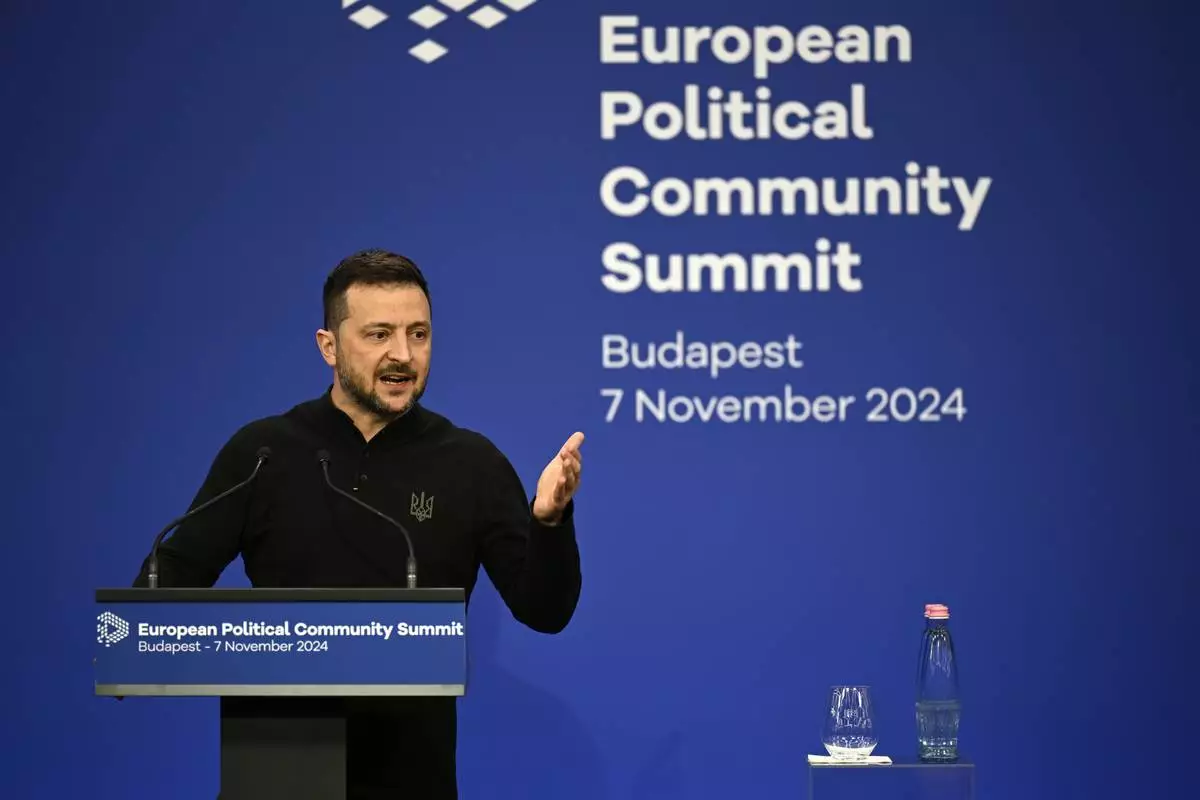
Ukraine's President Volodymyr Zelenskyy speaks during a press conference during the European Political Community (EPC) Summit at the Puskas Arena in Budapest , Hungary, Thursday, Nov. 7, 2024. (AP Photo/Denes Erdos)
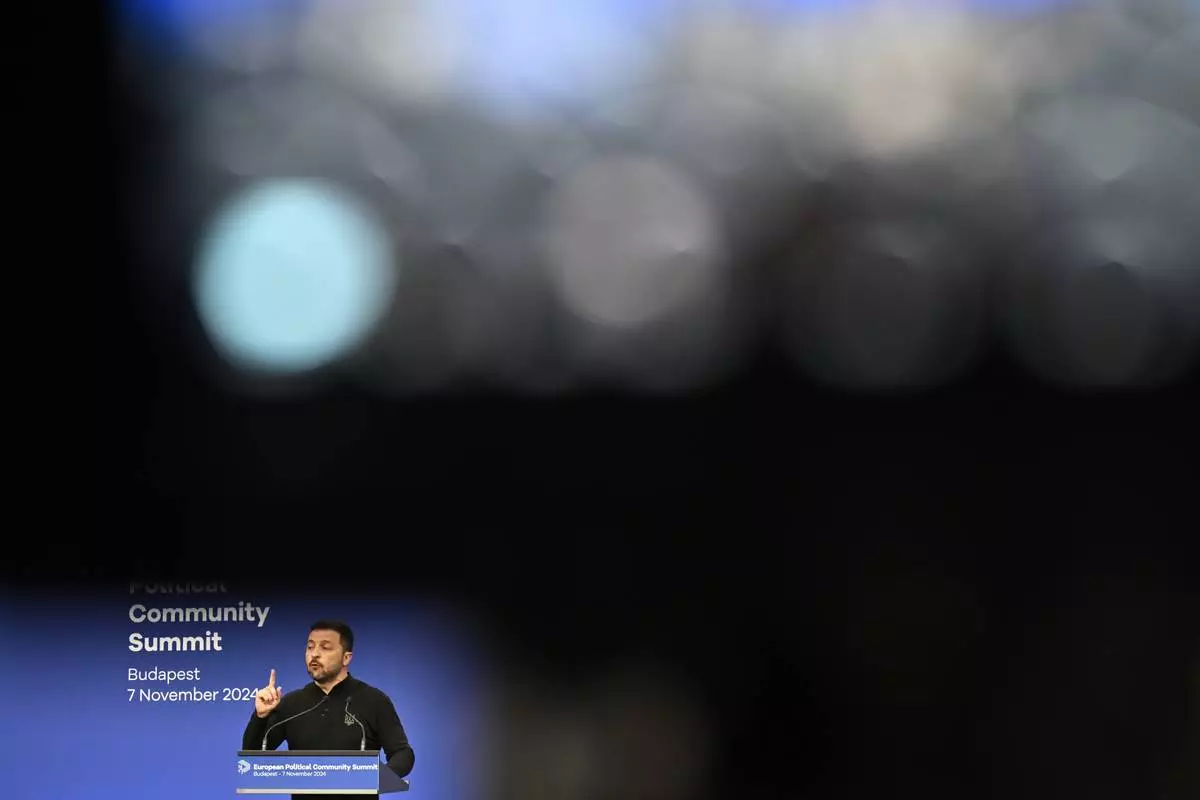
Ukraine's President Volodymyr Zelenskyy speaks during a press conference during the European Political Community (EPC) Summit at the Puskas Arena in Budapest , Hungary, Thursday, Nov. 7, 2024. (AP Photo/Denes Erdos)
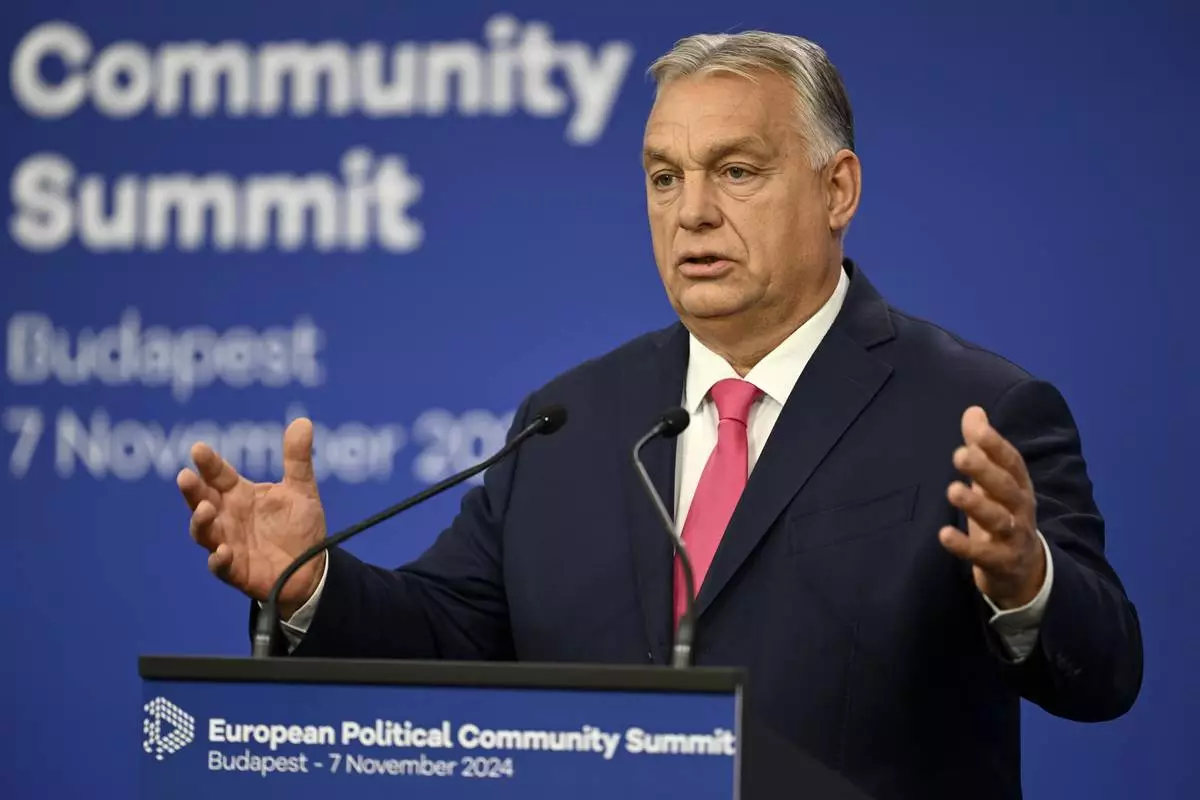
Hungary's Prime Minister Viktor Orban gestures during a press conference during the European Political Community (EPC) Summit at the Puskas Arena in Budapest , Hungary, Thursday, Nov. 7, 2024. (AP Photo/Denes Erdos)
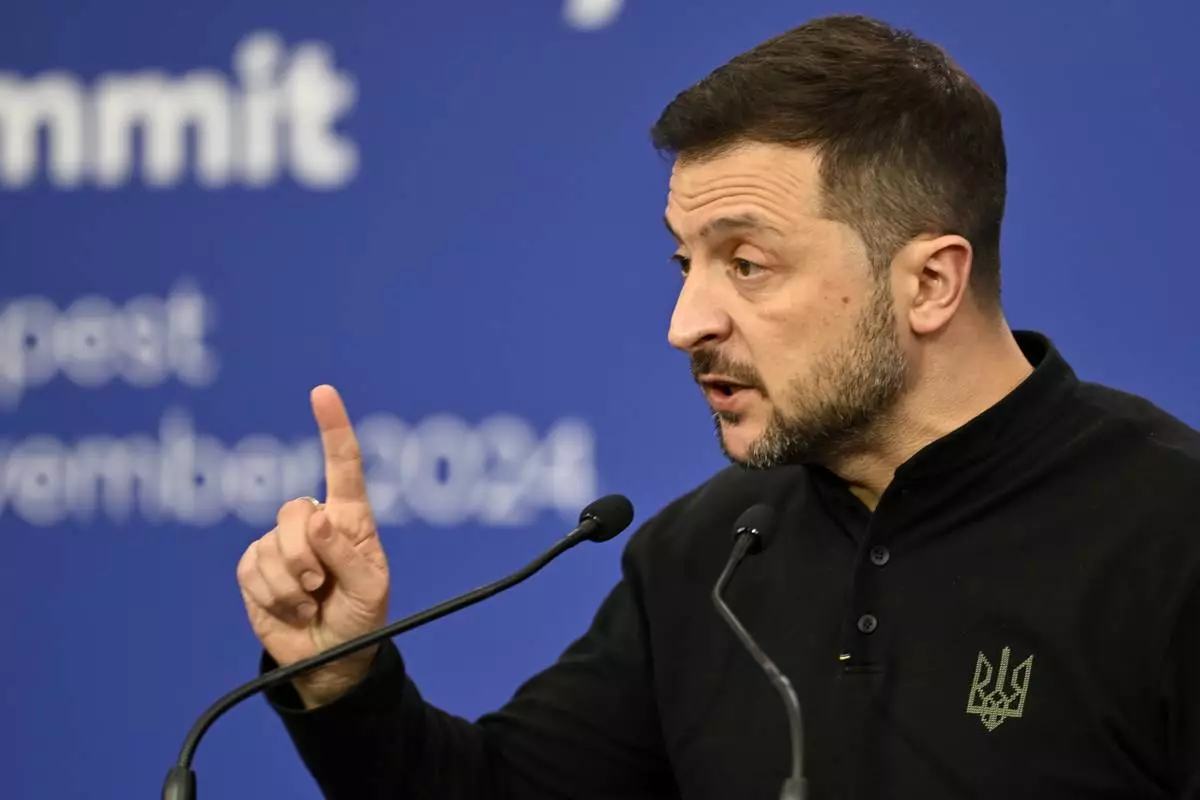
Ukraine's President Volodymyr Zelenskyy speaks during a press conference during the European Political Community (EPC) Summit at the Puskas Arena in Budapest , Hungary, Thursday, Nov. 7, 2024. (AP Photo/Denes Erdos)
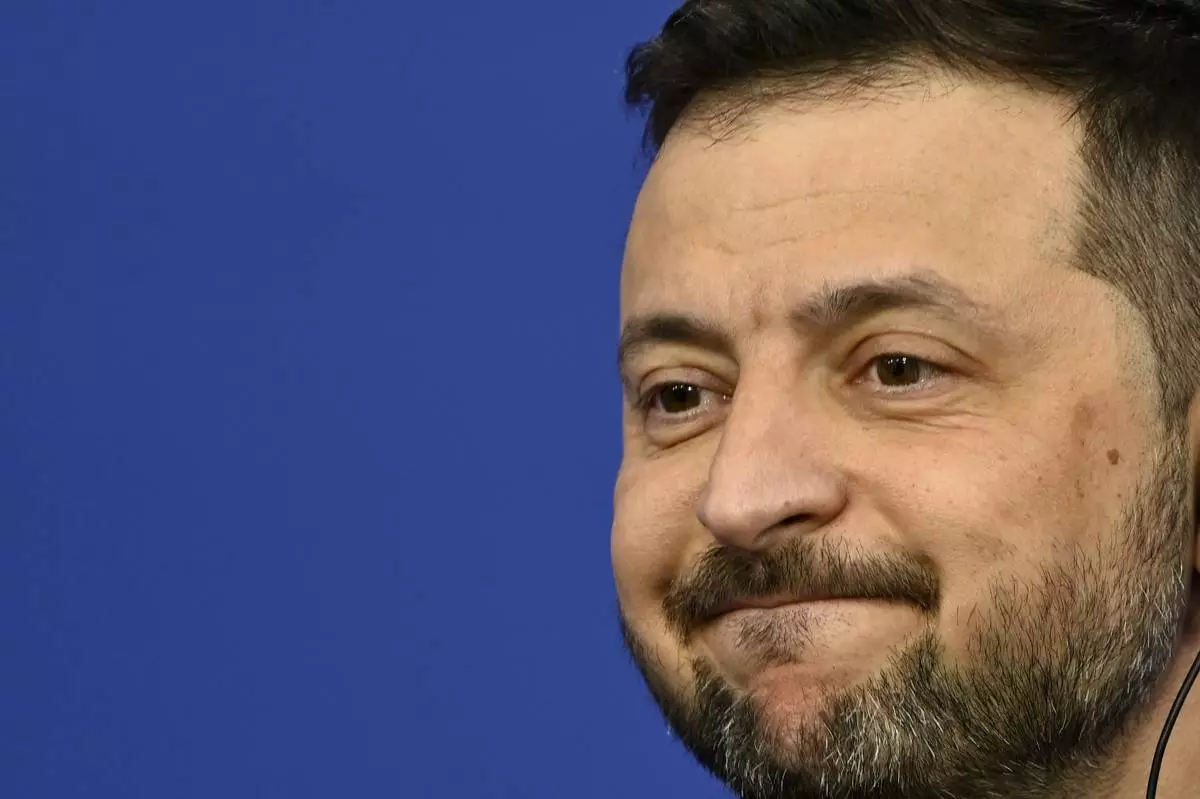
Ukraine's President Volodymyr Zelenskyy attends a press conference during the European Political Community (EPC) Summit at the Puskas Arena in Budapest , Hungary, Thursday, Nov. 7, 2024. (AP Photo/Denes Erdos)
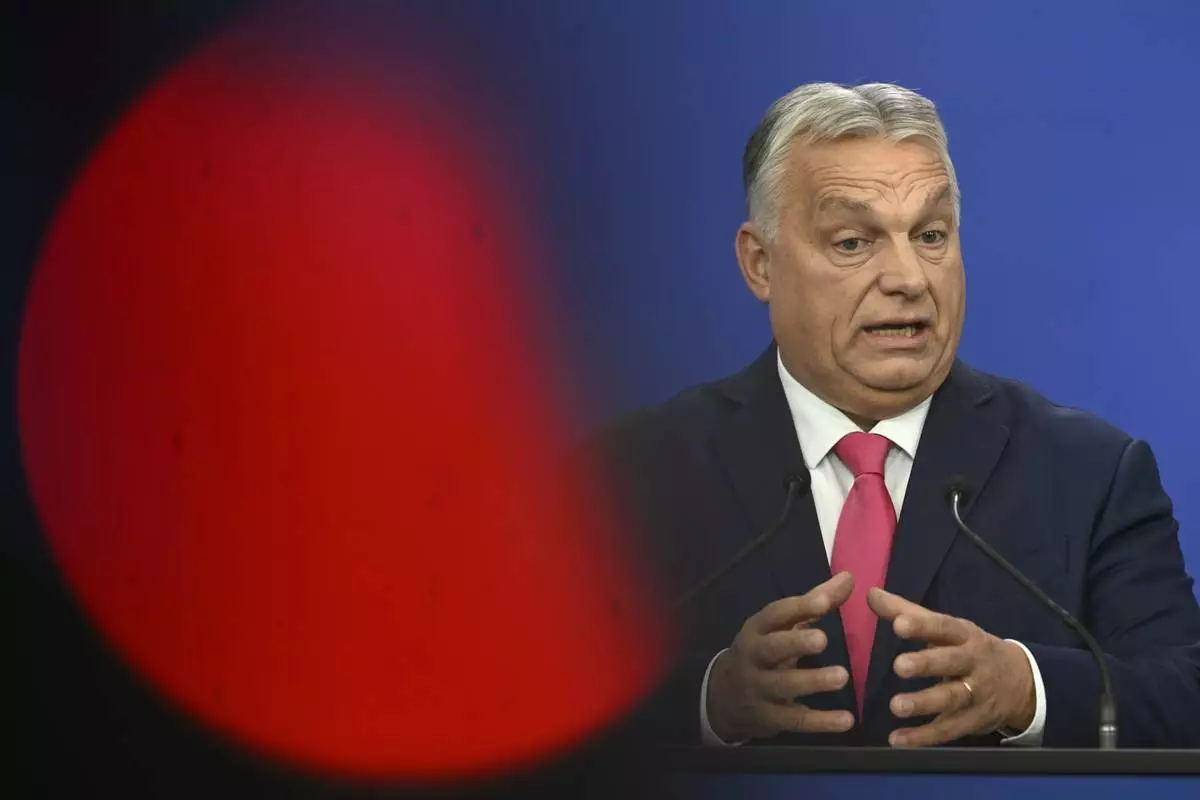
Hungary's Prime Minister Viktor Orban speaks during a press conference during the European Political Community (EPC) Summit at the Puskas Arena in Budapest , Hungary, Thursday, Nov. 7, 2024. (AP Photo/Denes Erdos)
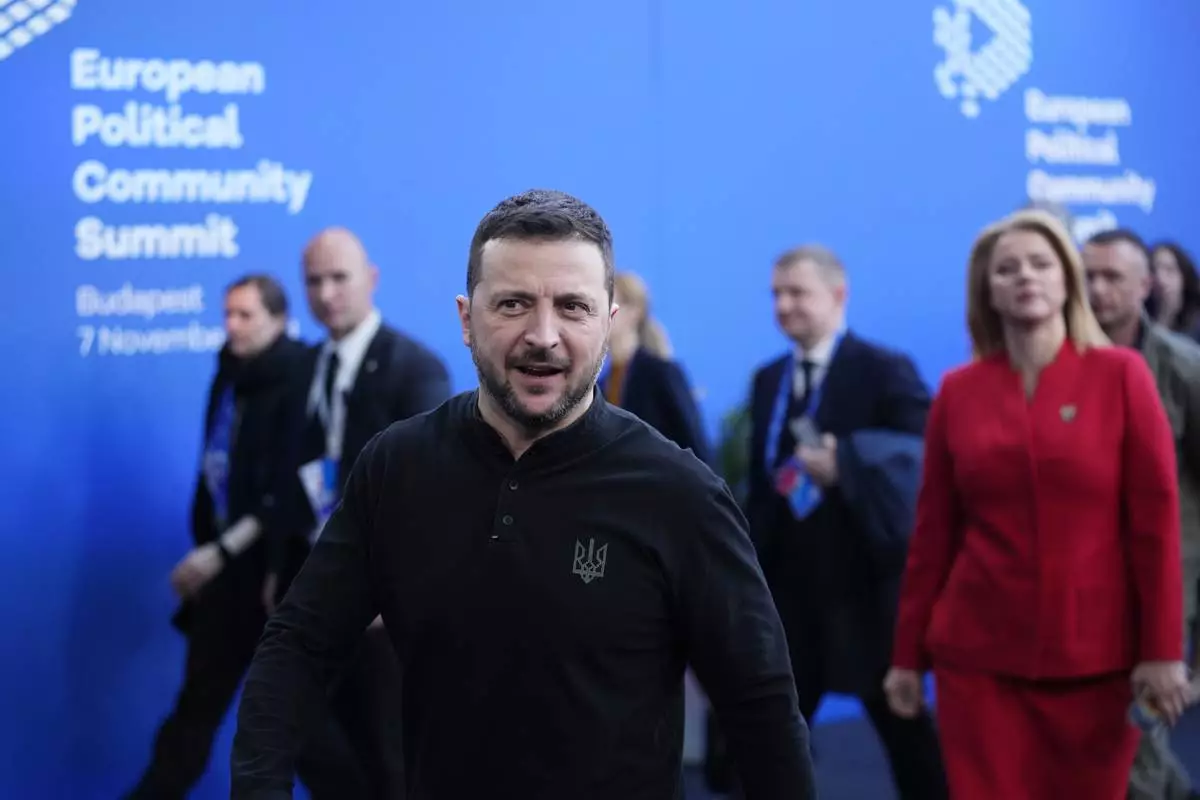
Ukraine's President Volodymyr Zelenskyy, center, and Latvia's Prime Minister Evika Silina, right, arrive for the European Political Community (EPC) Summit at the Puskas Arena in Budapest, Hungary, Thursday, Nov. 7, 2024. (AP Photo/Petr Josek)
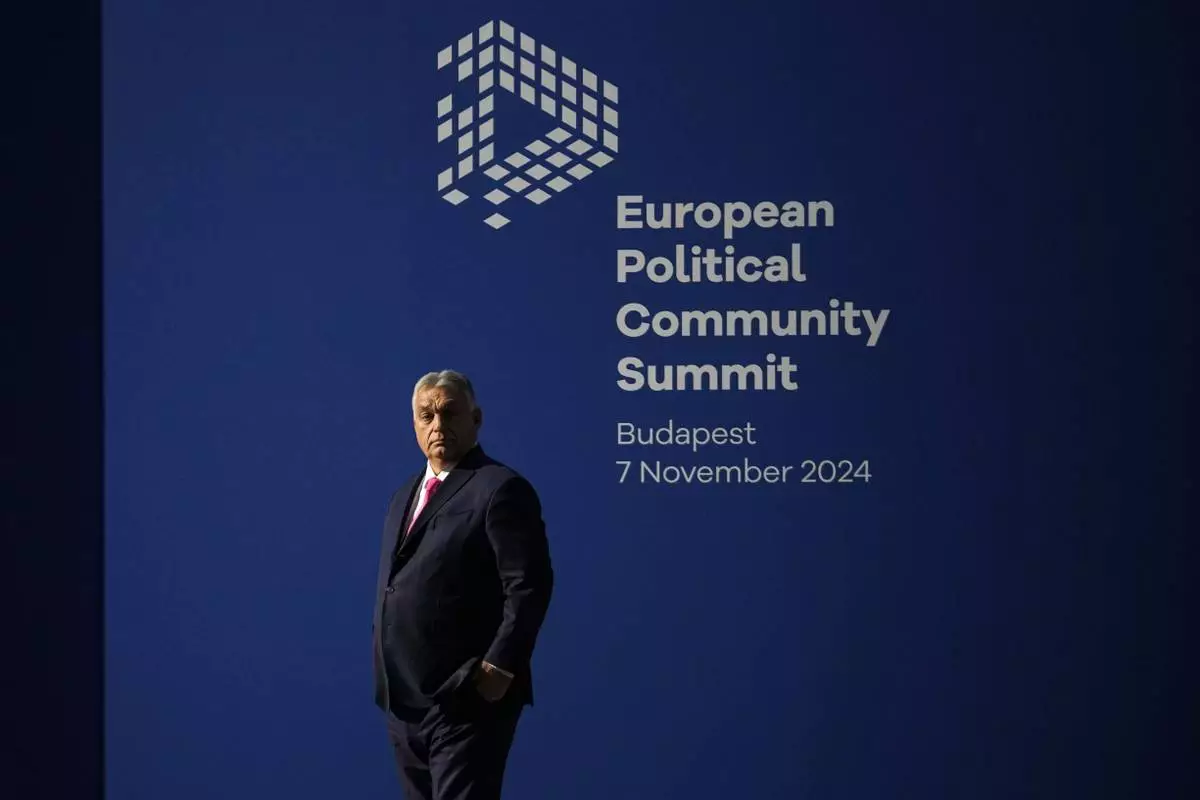
Hungary's Prime Minister Viktor Orban waits for the arrival of leaders for the European Political Community (EPC) Summit at the Puskas Arena in Budapest, Hungary, Thursday, Nov. 7, 2024. (AP Photo/Petr David Josek)
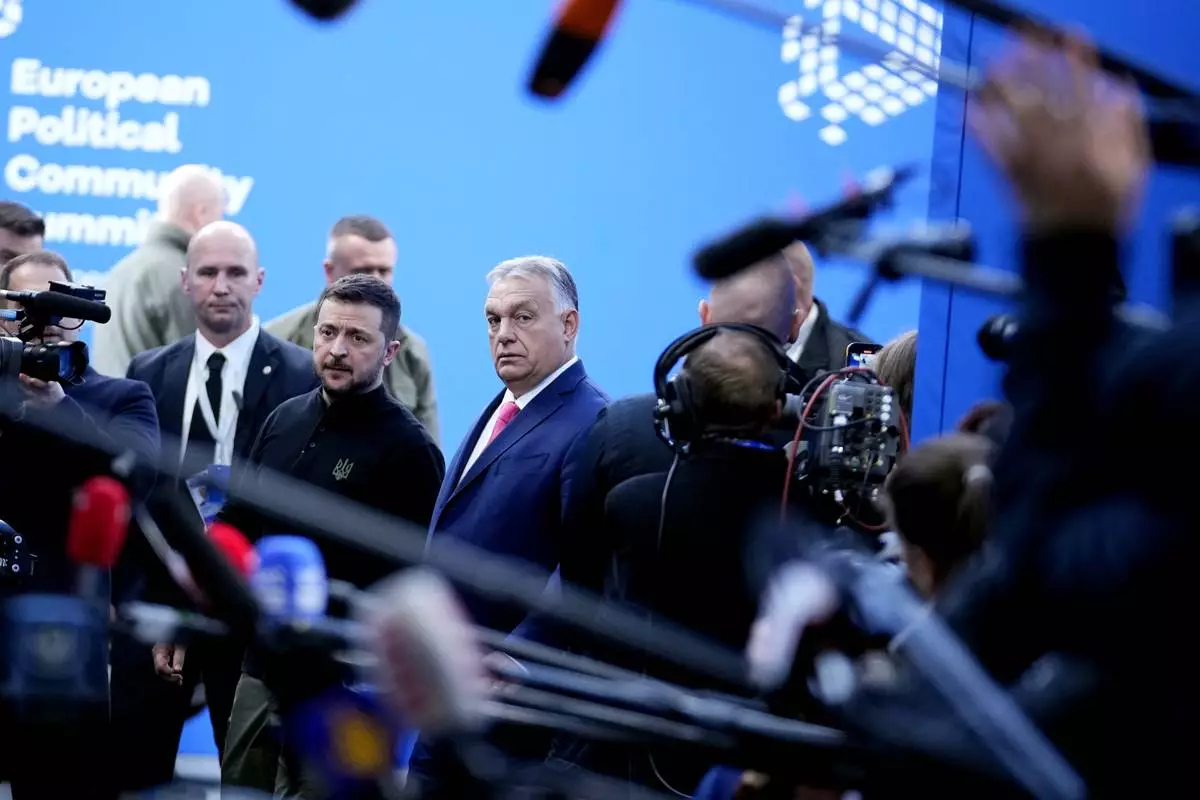
Ukraine's President Volodymyr Zelenskyy, center left, speaks with Hungary's Prime Minister Viktor Orban, center right, as he arrives for the European Political Community (EPC) Summit at the Puskas Arena in Budapest, Hungary, Thursday, Nov. 7, 2024. (AP Photo/Petr Josek)
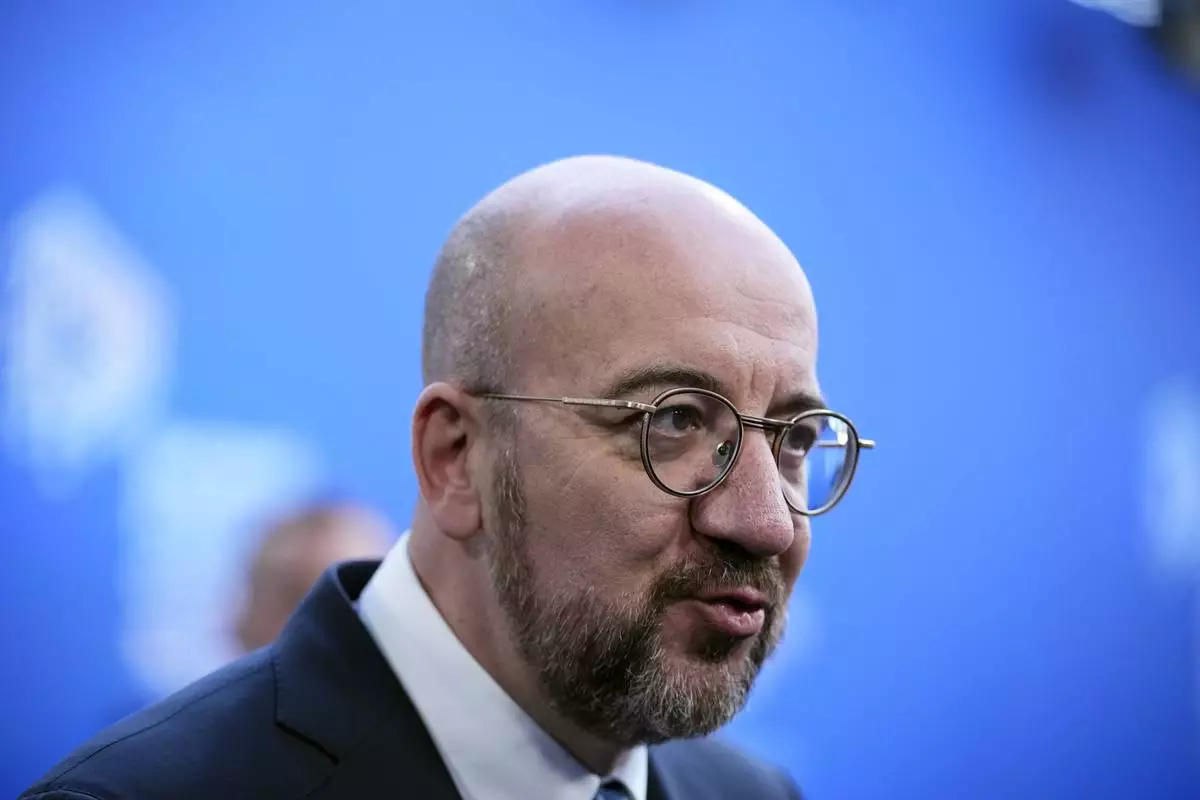
European Council President Charles Michel speaks with the media as he arrives for the European Political Community (EPC) Summit at the Puskas Arena in Budapest, Hungary, Thursday, Nov. 7, 2024. (AP Photo/Petr Josek)
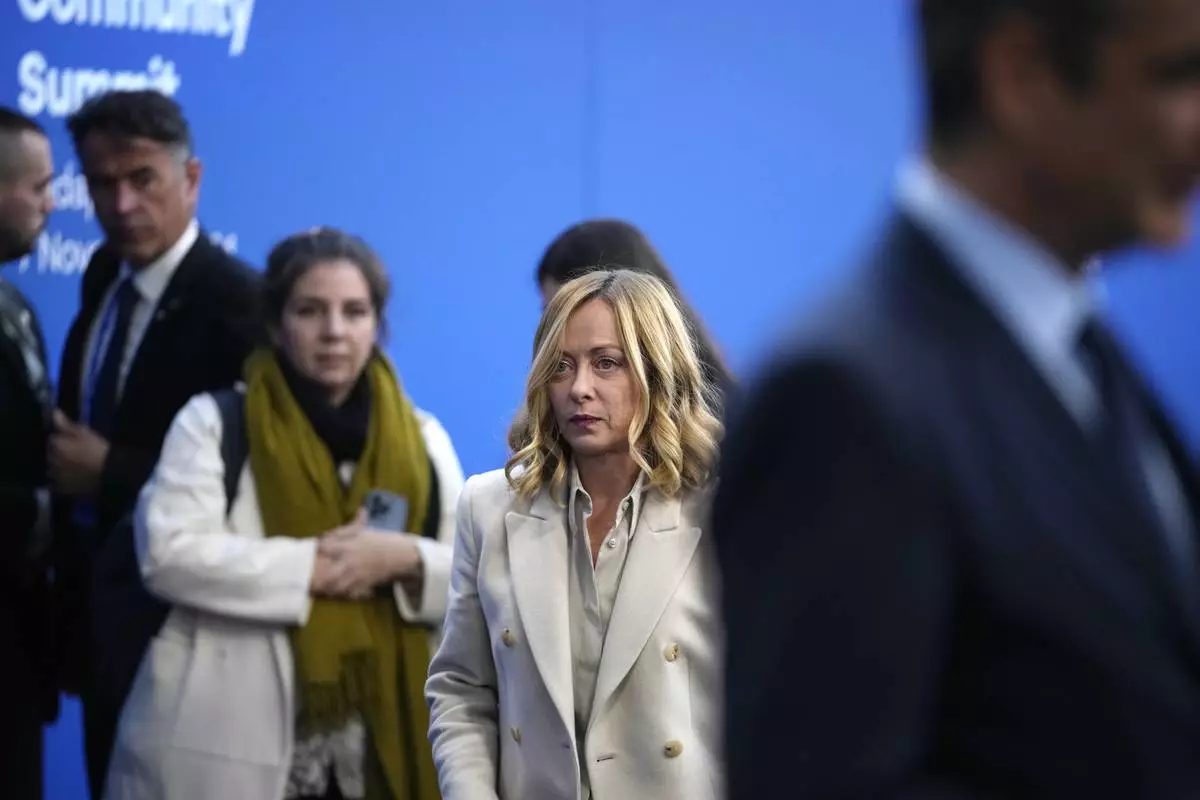
Italy's Prime Minister Giorgia Meloni, center, arrives for the European Political Community (EPC) Summit at the Puskas Arena in Budapest, Hungary, Thursday, Nov. 7, 2024. (AP Photo/Petr Josek)
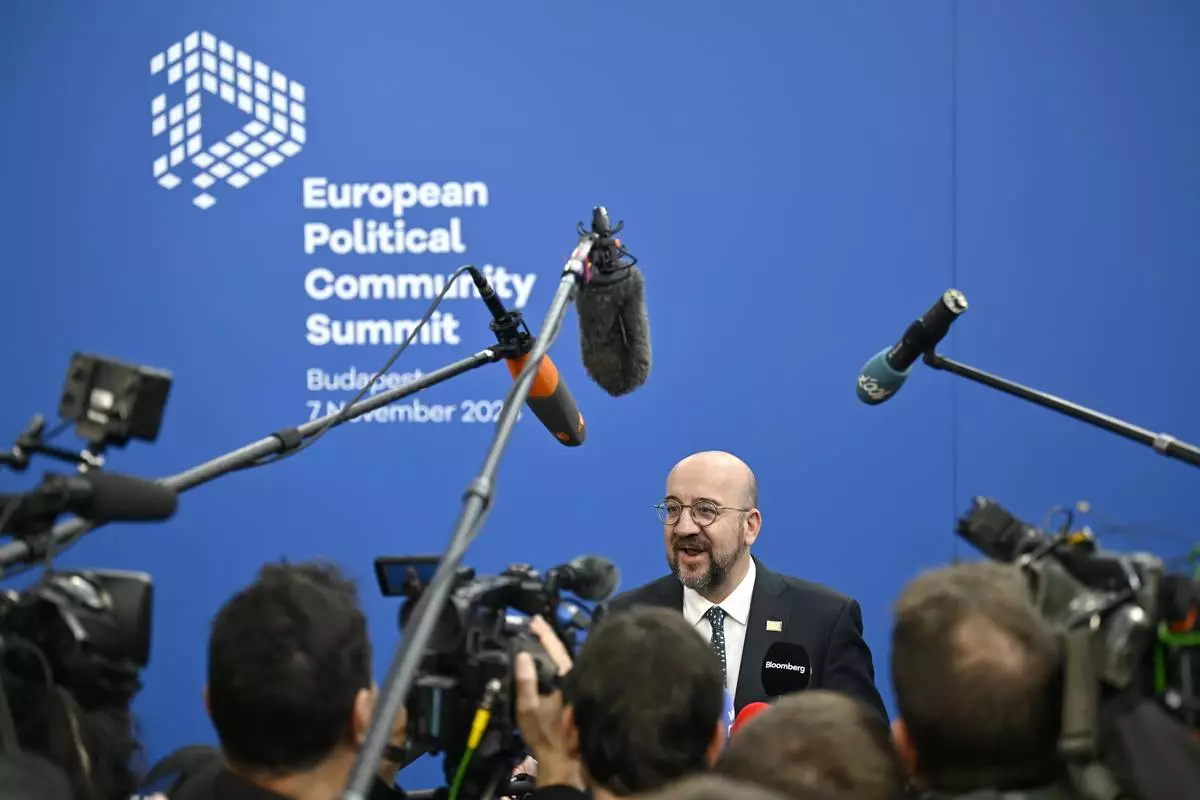
European Council President Charles Michel speaks with the media as he arrives for the European Political Community (EPC) Summit at the Puskas Arena in Budapest, Thursday, Nov. 7, 2024. (AP Photo/Denes Erdos)
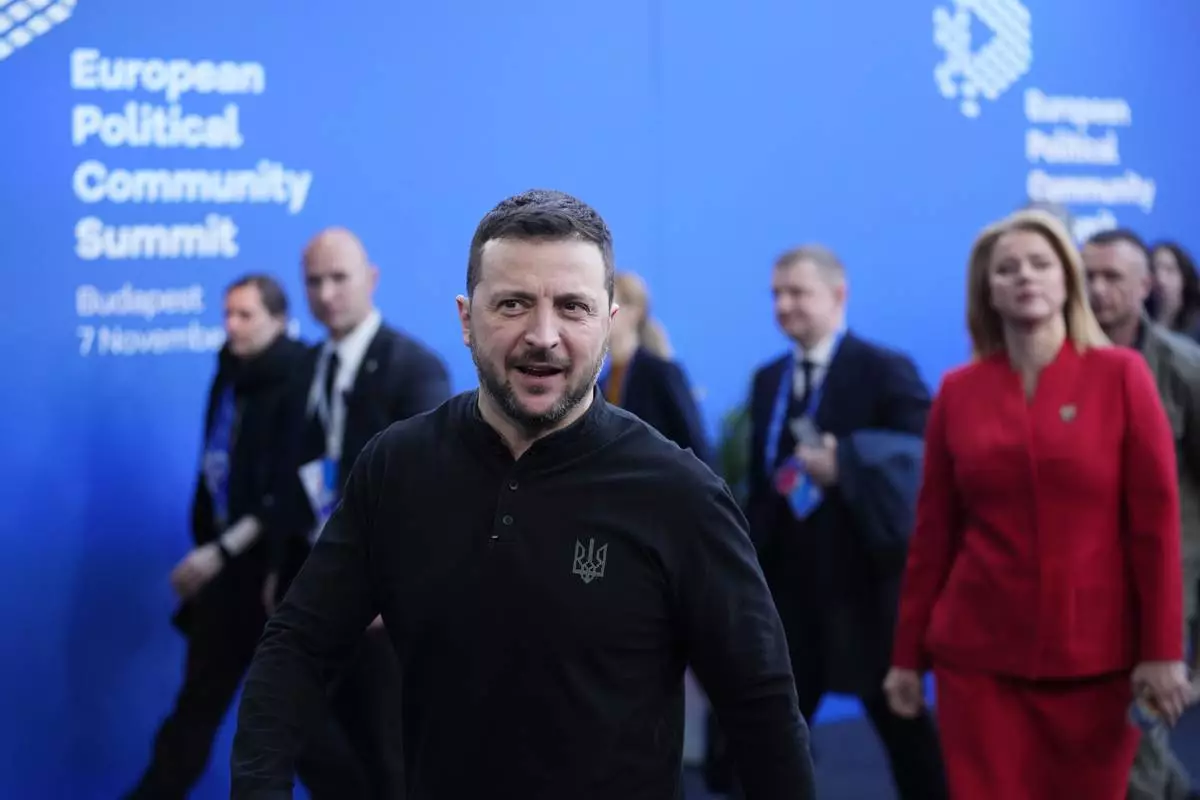
Ukraine's President Volodymyr Zelenskyy, center, and Latvia's Prime Minister Evika Silina, right, arrive for the European Political Community (EPC) Summit at the Puskas Arena in Budapest, Hungary, Thursday, Nov. 7, 2024. (AP Photo/Petr Josek)
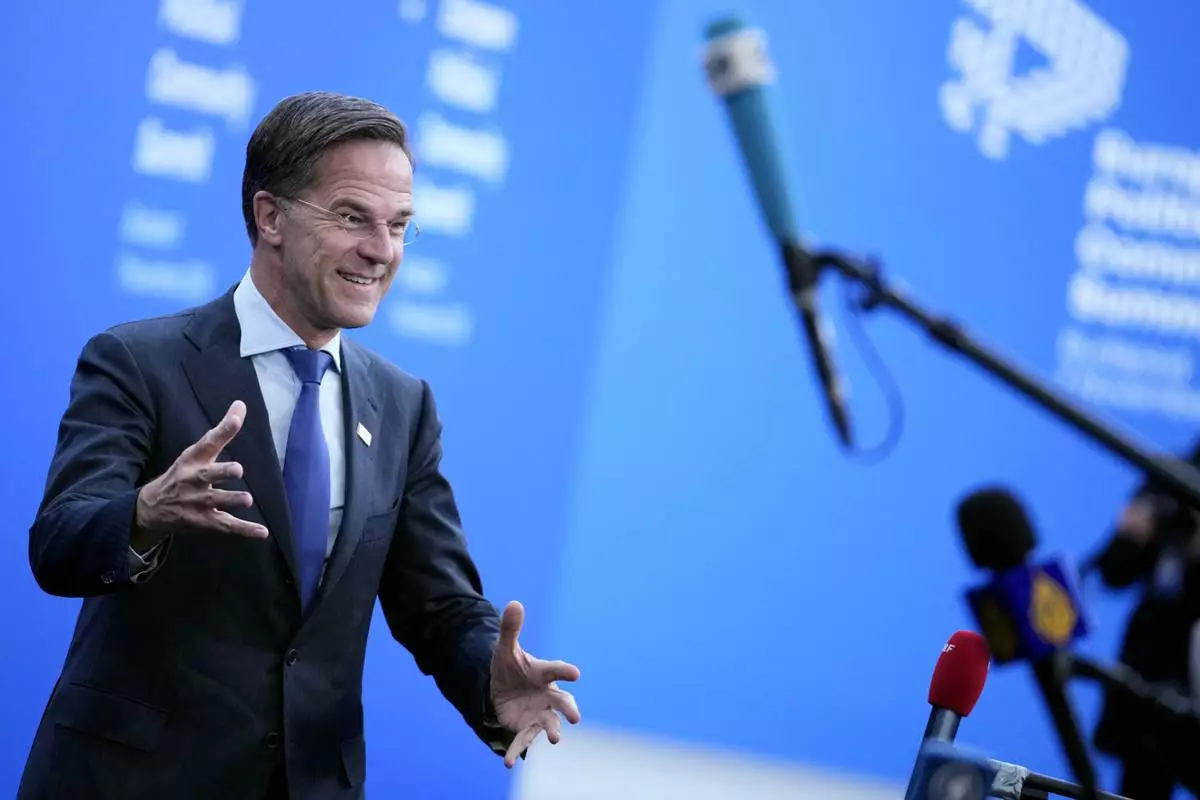
NATO Secretary General Mark Rutte speaks with the media as he arrives for the European Political Community (EPC) Summit at the Puskas Arena in Budapest, Hungary, Thursday, Nov. 7, 2024. (AP Photo/Petr Josek)
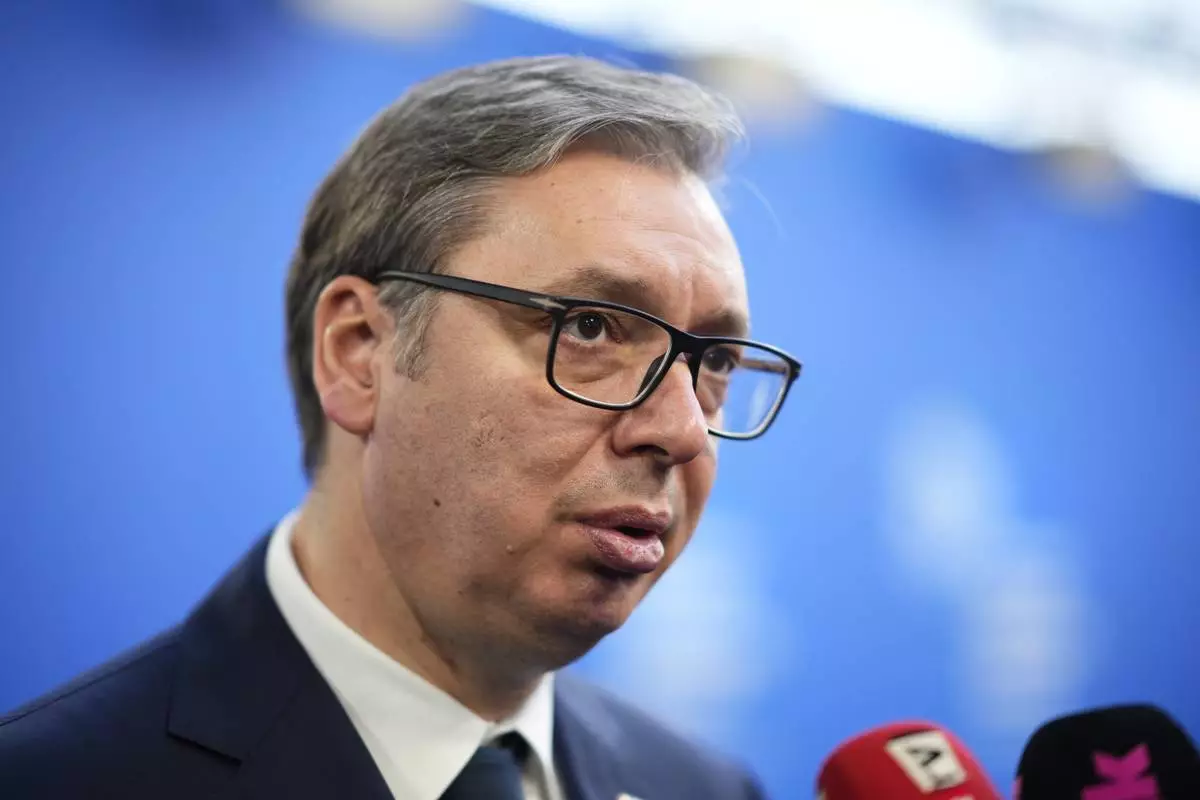
Serbia's President Aleksander Vucic speaks with the media as he arrives for the European Political Community (EPC) Summit at the Puskas Arena in Budapest, Hungary, Thursday, Nov. 7, 2024. (AP Photo/Petr Josek)
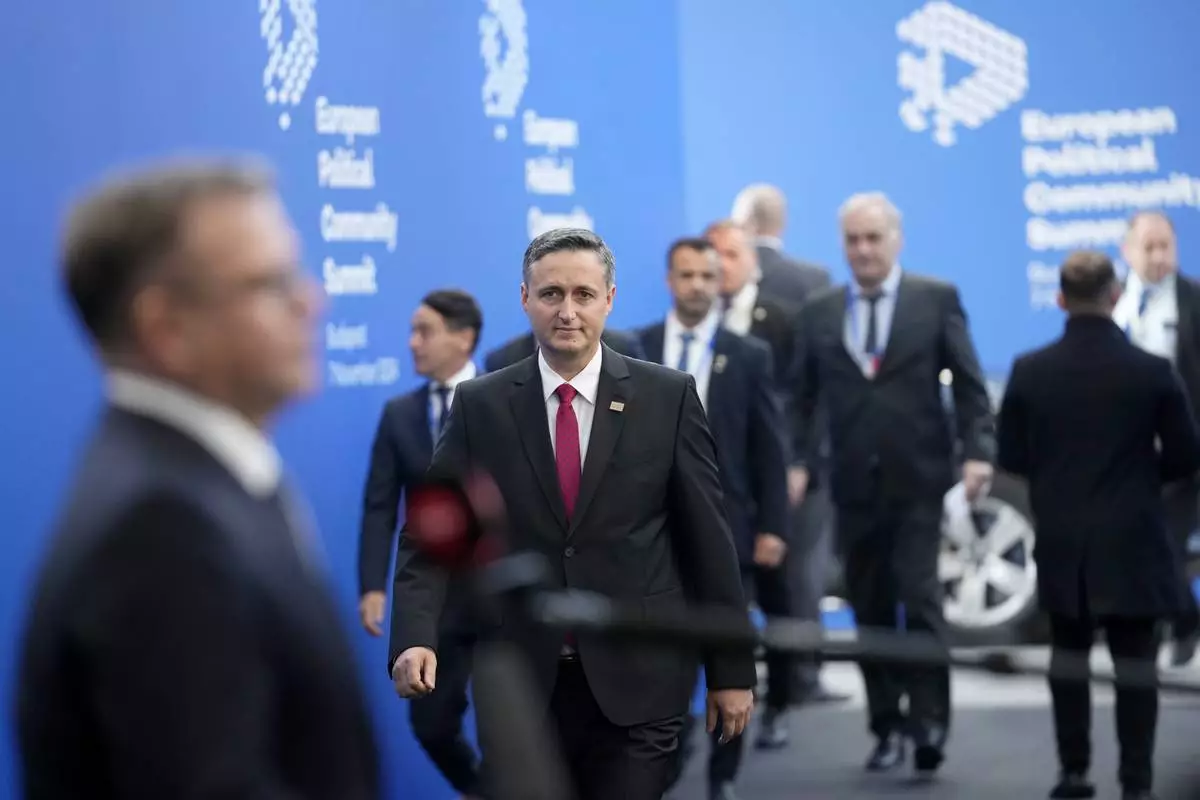
Chairman of the Presidency of Bosnia and Herzegovina Denis Becirovic, center, arrives for the European Political Community (EPC) Summit at the Puskas Arena in Budapest, Hungary, Thursday, Nov. 7, 2024. (AP Photo/Petr Josek)
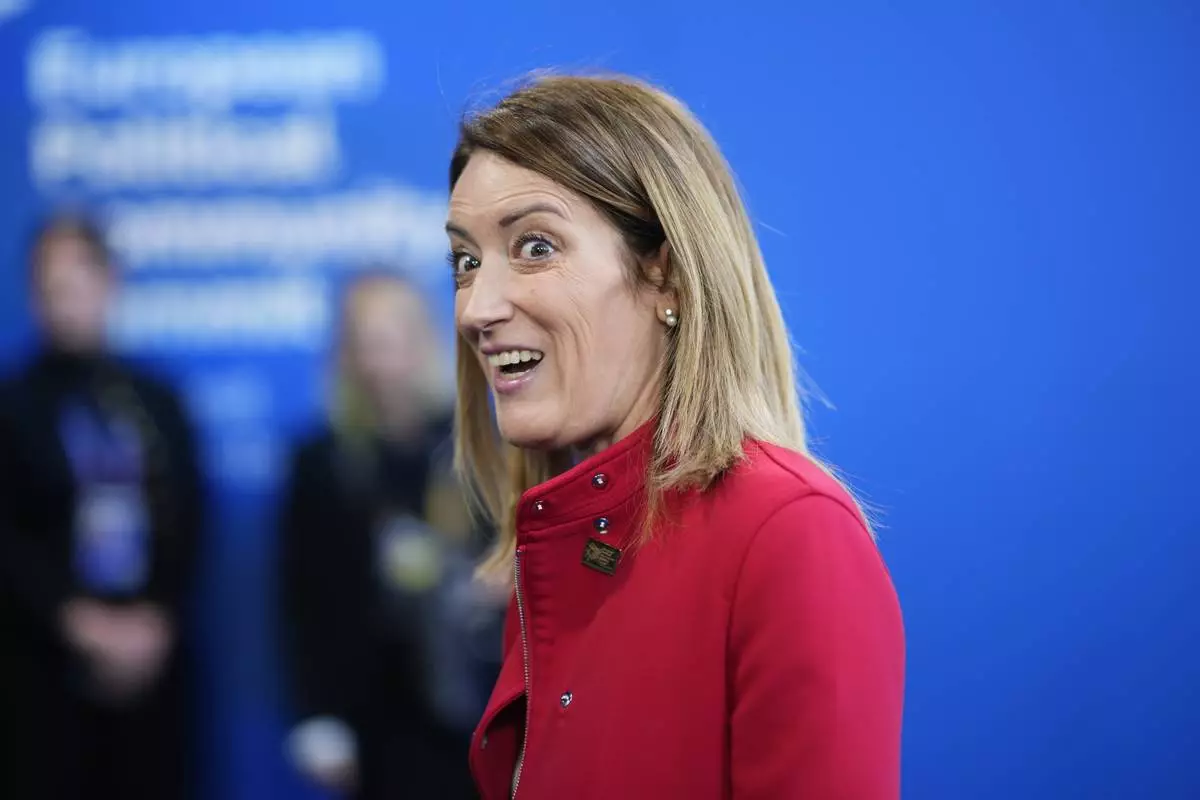
European Parliament President Roberta Metsola arrives for the European Political Community (EPC) Summit at the Puskas Arena in Budapest, Hungary, Thursday, Nov. 7, 2024. (AP Photo/Petr Josek)
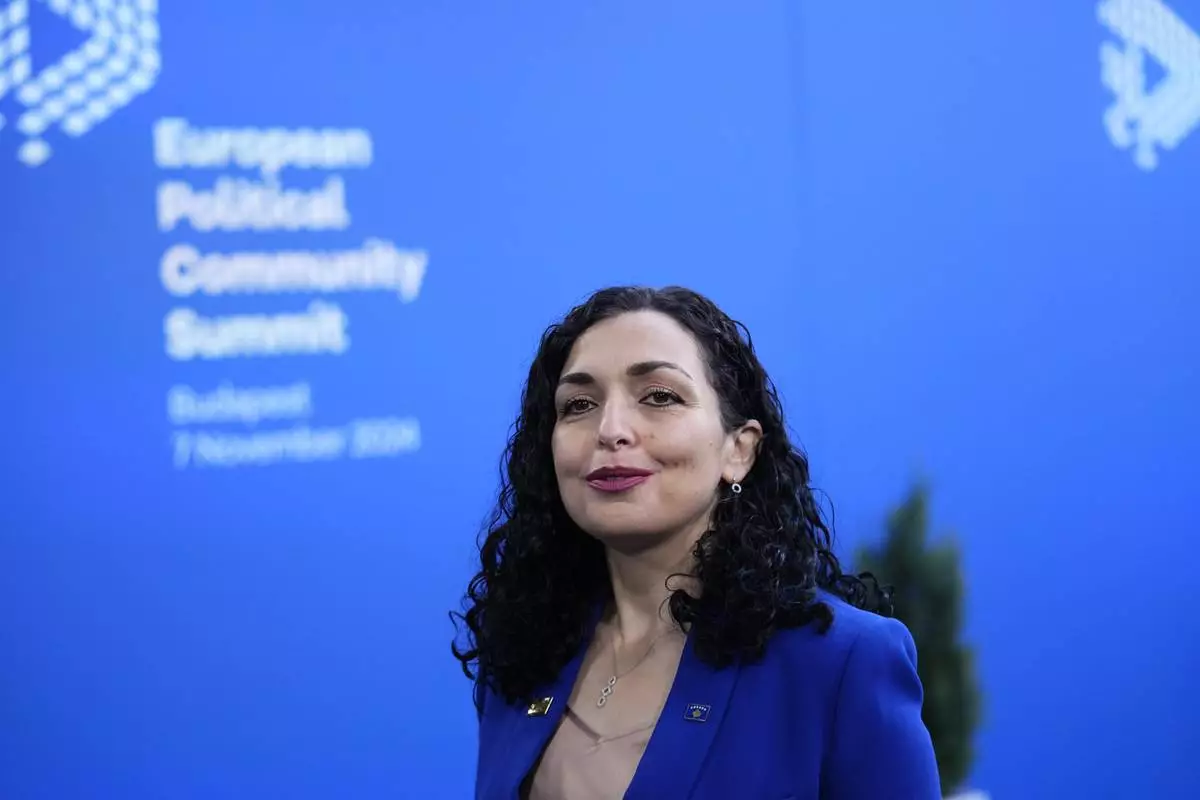
Kosovo's President Vjosa Osmani arrives for the European Political Community (EPC) Summit at the Puskas Arena in Budapest, Hungary, Thursday, Nov. 7, 2024. (AP Photo/Petr Josek)
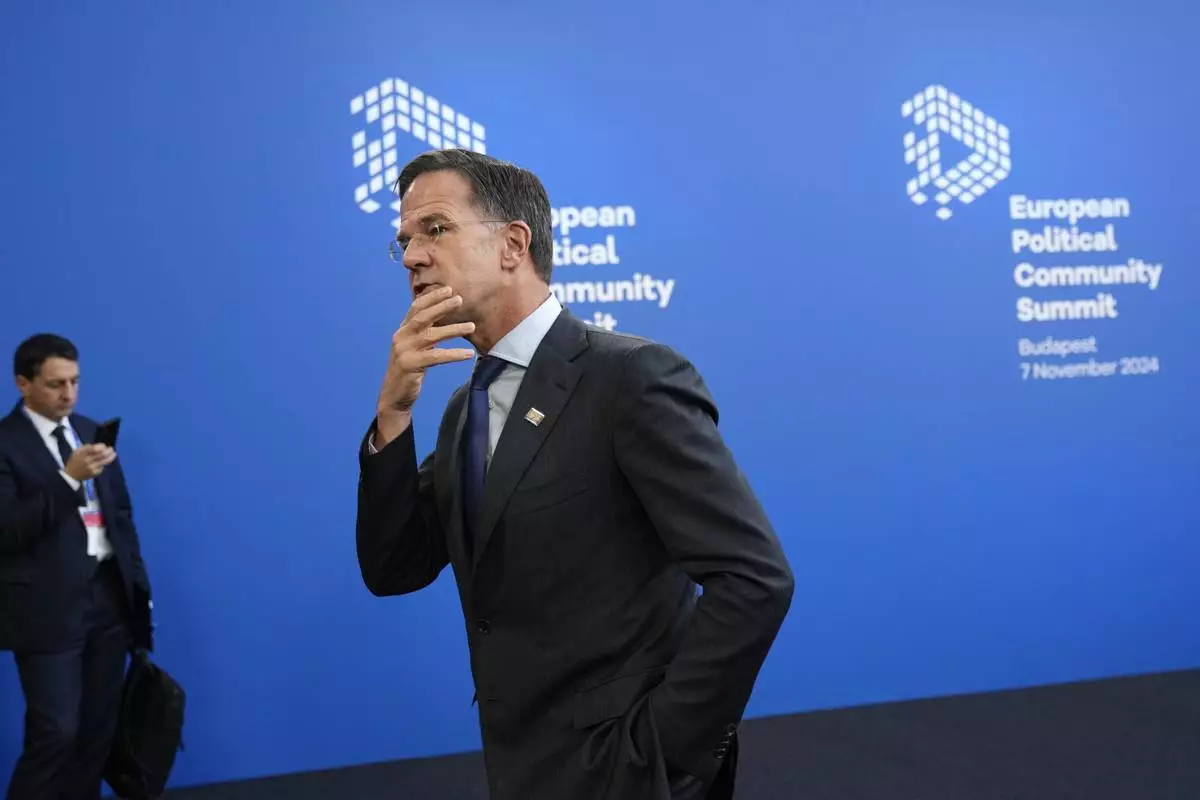
NATO Secretary General Mark Rutte arrives for the European Political Community (EPC) Summit at the Puskas Arena in Budapest, Hungary, Thursday, Nov. 7, 2024. (AP Photo/Petr Josek)
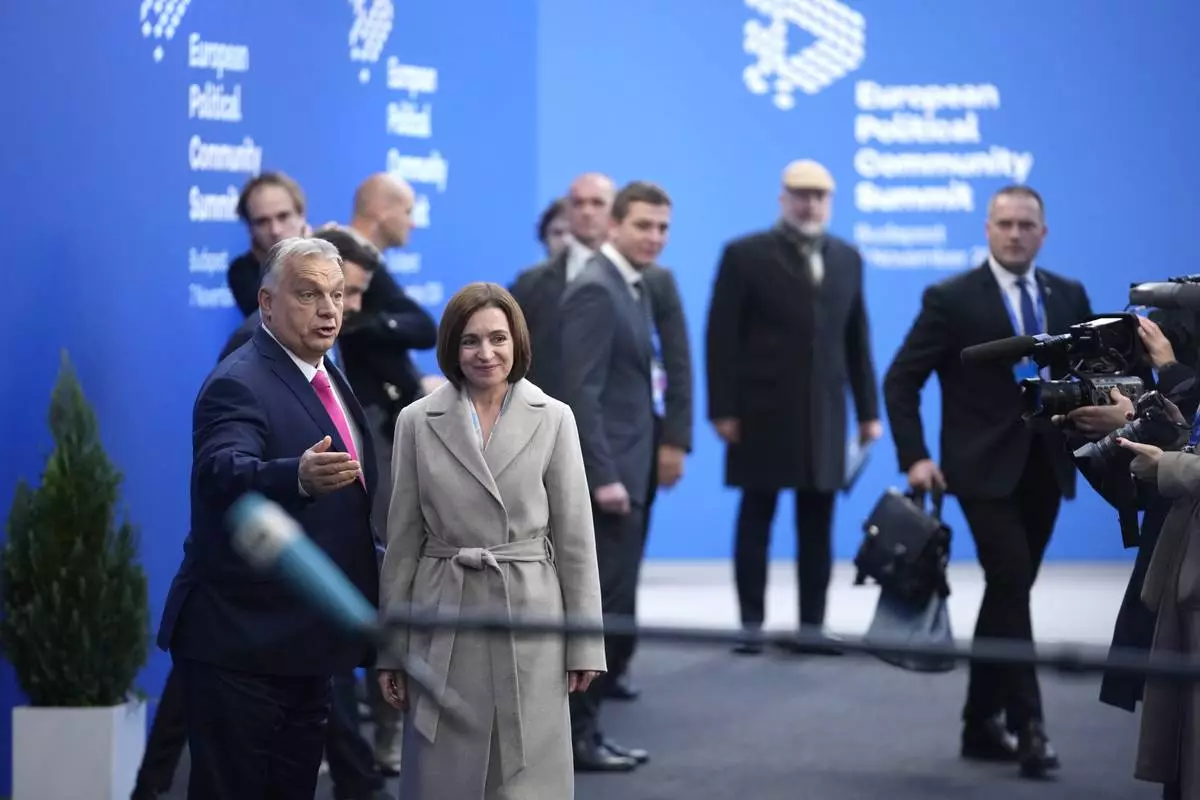
Hungary's Prime Minister Viktor Orban, left, welcomes Moldova's President Maia Sandu during arrivals for the European Political Community (EPC) Summit at the Puskas Arena in Budapest, Hungary, Thursday, Nov. 7, 2024. (AP Photo/Petr Josek)
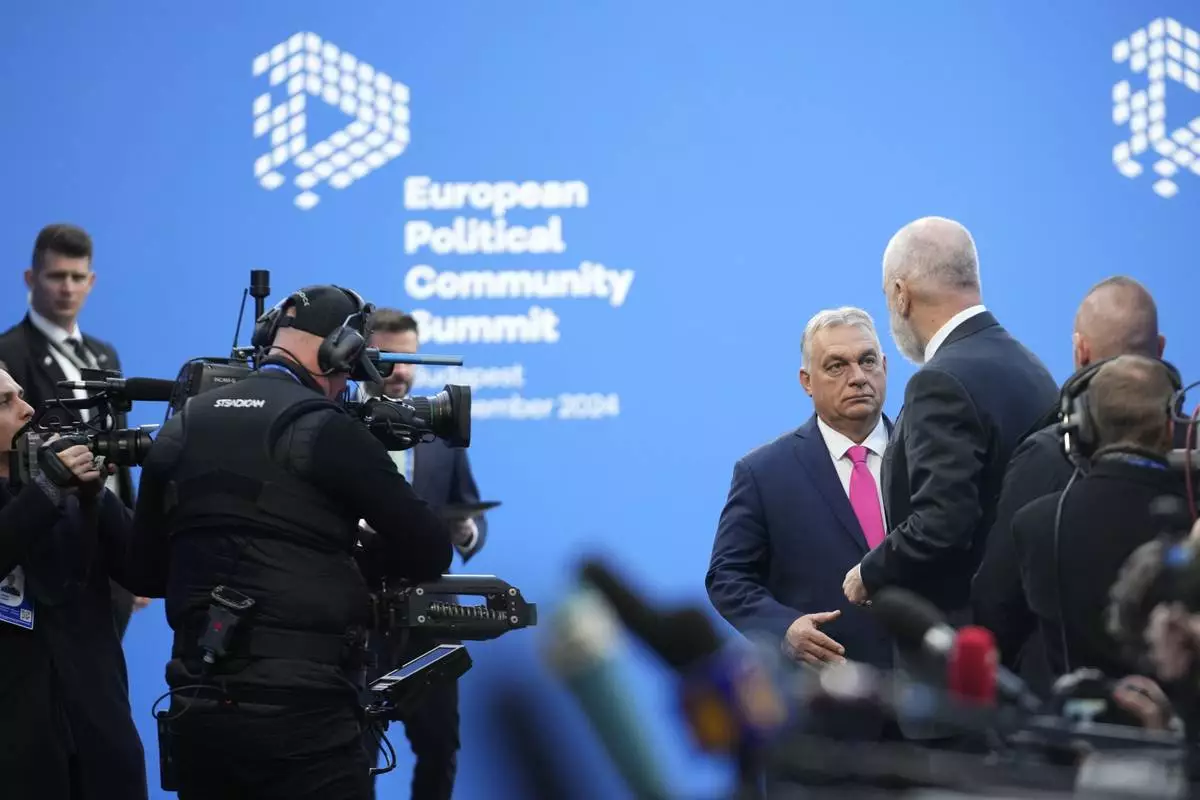
Albania's Prime Minister Edi Rama, right, speaks with Hungary's Prime Minister Viktor Orban, center, as he arrives for the European Political Community (EPC) Summit at the Puskas Arena in Budapest, Hungary, Thursday, Nov. 7, 2024. (AP Photo/Petr Josek)
BILLINGS, Mont. (AP) — Democrats' crushing loss in Montana's nationally important U.S. Senate race settled a fierce political debate over whether a surge of newcomers in the past decade favored Republicans — and if one of the new arrivals could even take high office.
Voters answered both questions with an emphatic “yes” with Tim Sheehy's defeat of three-term Democratic Sen. Jon Tester, helping deliver a GOP Senate majority and laying bare a drastic cultural shift in a state that long prided itself on electing home-grown candidates based on personal qualifications, not party affiliation.
It’s the first time in almost a century that one party totally dominates in Montana. Corporations and mining barons known as the Copper Kings once had a corrupt chokehold on the state’s politics, and an aversion to outsiders that arose from those times has faded, replaced by a partisan fervor that Republicans capitalized on during the election.
Tester, a moderate lawmaker and third-generation grain farmer from humble Big Sandy, Montana, lost to wealthy aerospace entrepreneur Sheehy, a staunch supporter of President-elect Donald Trump who arrived in Montana 10 years ago and bought a house in the ritzy resort community of Big Sky.
“The political culture in Montana has changed fundamentally over the past 10 to 15 years,” said University of Montana history professor Jeff Wiltse. “The us vs. them, Montanans vs. outsiders mentality that has a long history in Montana has significantly weakened.”
The state's old instinct for choosing its own, regardless of party, gave way to larger trends that began more than a decade ago and accelerated during the pandemic.
Job opportunities in mining, logging and railroad work — once core Democratic constituencies — dried up. Newcomers, many drawn by the state's natural social distancing, came in droves — with almost 52,000 new arrivals since 2020. That's almost as many as the entire prior decade, according to U.S. Census data. As the population changed, national issues such as immigration and gender identity came to dominate political attention, distracting from local issues.
The 2024 Senate race brought a record-setting flood of outside money on both sides — more than $315 million, much of it from shadowy groups with wealthy donors. That effectively erased Montana’s efforts over more than a century to limit corporate cash in politics.
Sheehy's win came after the party ran the table in recent Montana elections where voters installed other wealthy Republicans including Gov. Greg Gianforte, U.S. Sen. Steve Daines and U.S. Rep.-elect Troy Downing.
Daines is the only one of the group originally from Montana — once a virtual requirement for gaining high office in the state.
The contrast between Montana's old and new politics was on vivid display on election night. Tester's party was a sedate event at the Best Western Inn in Great Falls — rooms for $142 a night — where the lawmaker mingled with a few dozen supporters and sipped on apple-flavored whiskey in a plastic cup.
Sheehy’s more boisterous affair was in Bozeman — the epicenter of Montana’s new wealth — at an upscale hotel where a standard room costs $395. Long before his victory was announced, carts bearing Champagne were rolled in as the candidate remained sequestered in a secure balcony area most of the night with select supporters.
Sheehy, a former U.S. Navy SEAL from Minnesota, moved to Montana after leaving the military and, along with his brother, founded Bridger Aerospace, an aerial firefighting company that depends on government contracts. Sheehy also bought a ranch in the Little Belt Mountains, and during the campaign cast himself as the modern equivalent of an early western settler seeking opportunity.
Tester received 22,000 more votes on Nov. 5 than in his last election — a gain that exceeded his margin of victory in previous wins. Yet for every additional Tester voter, Sheehy gained several more. The result was a resounding eight-point win for the Republican, removing Democrats from the last statewide office they still held in Montana.
For Republicans, it completed their domination of states stretching from the Northern Plains to the Rocky Mountains.
“We have North Dakota, South Dakota, Montana, Wyoming, Utah — we’re all kind of red now,” said Montana Republican Party Chairman Don Kaltschmidt.
Democrats as recently as 2007 held a majority of Senate seats in the Northern Plains and almost every statewide office in Montana.
Daines — who led GOP efforts to retake the Senate as chairman of the National Republican Senatorial Committee — pointed out during Sheehy's election party that Republicans would control both Montana Senate seats for the first time in more than a century.
Tester and other Democrats bemoan the wealth that's transformed the state. It's most conspicuous in areas like Big Sky and Kalispell, where multimillion-dollar homes occupy the surrounding mountainsides while throngs of service workers struggle to find housing.
It's not quite the same as the Copper Kings — who at their peak controlled elected officials from both major parties — but Democrats see parallels.
“What do they say — history doesn’t repeat itself but it rhymes,” said Monica Tranel, the defeated Democratic candidate in a western Montana House district. “It is very evocative of what happened in the early 1900s. It’s very much a time of change and turmoil and who has a voice.”
Montana in 2022 gained a second House seat due to population growth over the prior decade, giving Democrats a chance to regain clout. After a narrow loss that year to former Trump Interior Sec. Ryan Zinke, Tranel ran again this year and lost.
Even as she turned to history to explain Montana's contemporary political dynamic, Tranel considered the future. She acknowledged that Democrats have fallen out of step with a conservative electorate more attuned to party labels.
“The label itself is what they are reacting to,” she said. “Do we need a different party at this point?”
Republican officials embraced wealthy newcomers.
Steve Kelly, 66, who calls himself a “conservative refugee,” moved to northwestern Montana from Nevada at the height of the pandemic. He spent most of his 30-year career in law enforcement in Reno, but said he tired of the city as it grew and became more liberal — “San Francisco East,” he called it.
In 2020, Kelly and his wife bought a house outside Kalispell on a few acres so they could have horses. He got involved with the local Republican party and this fall won a seat in the state Legislature on an anti-illegal immigration platform.
“It seems to be different here. Most of the people we have met have also been conservative refugees, getting away from other cities,” he said.
Driving the growth are transplants from western states dominated by Democrats, especially California, where more than 85,000 Montana residents originated, or about 7.5% of the population, Census data shows. Almost half of Montana residents were born out of state.
Worker wages in Montana have been stagnant for decades, said Megan Lawson with the independent research group Headwaters Economics in Bozeman. Income from stocks, real estate and other investments has risen sharply, reflecting the changing — and wealthier — demographic.
“Certainly a large share of it is coming from folks who are moving into this state,” Lawson said. “When you put all this together it helps to explain the story of the political shift."
Associated Press reporter Michael Schneider in Orlando, Florida, contributed to this report.
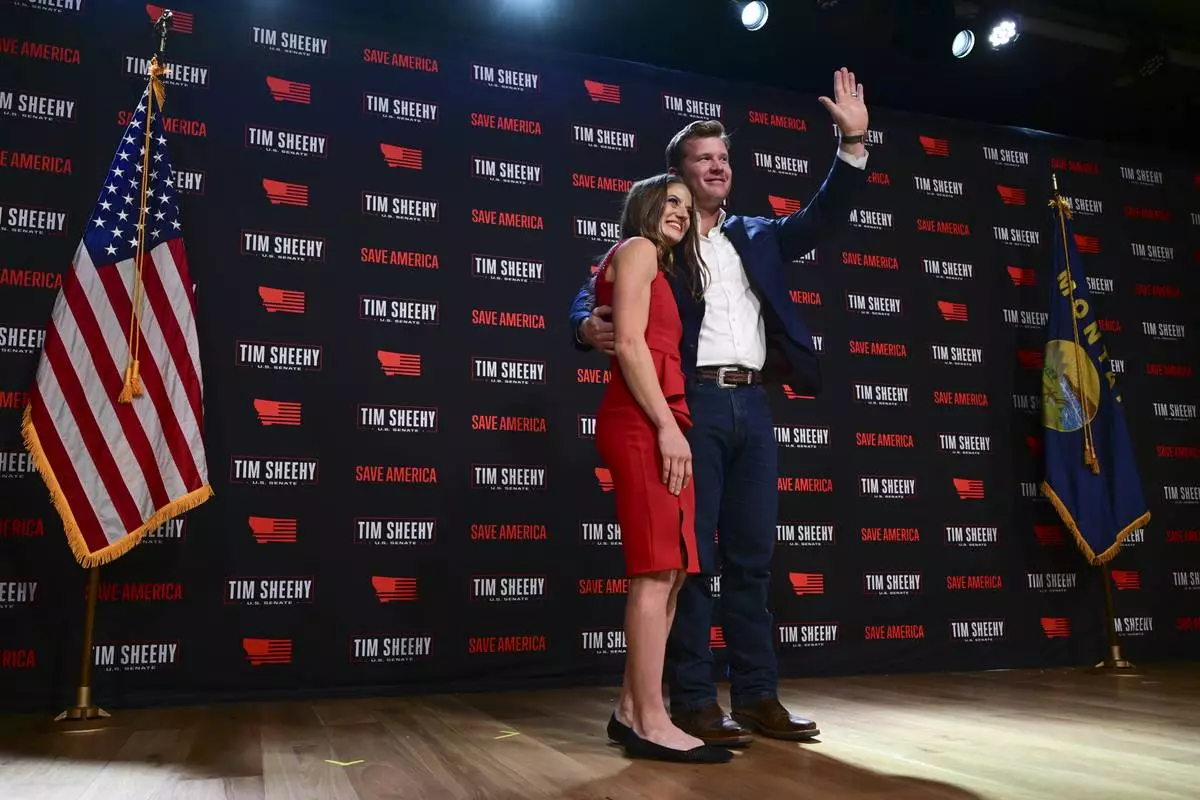
FILE - Republican Montana Senate candidate Tim Sheehy, right, waves to supporters with his wife, Carmen Sheehy, during an election night watch party, Nov. 6, 2024, in Bozeman, Mont. (AP Photo/Tommy Martino, File)
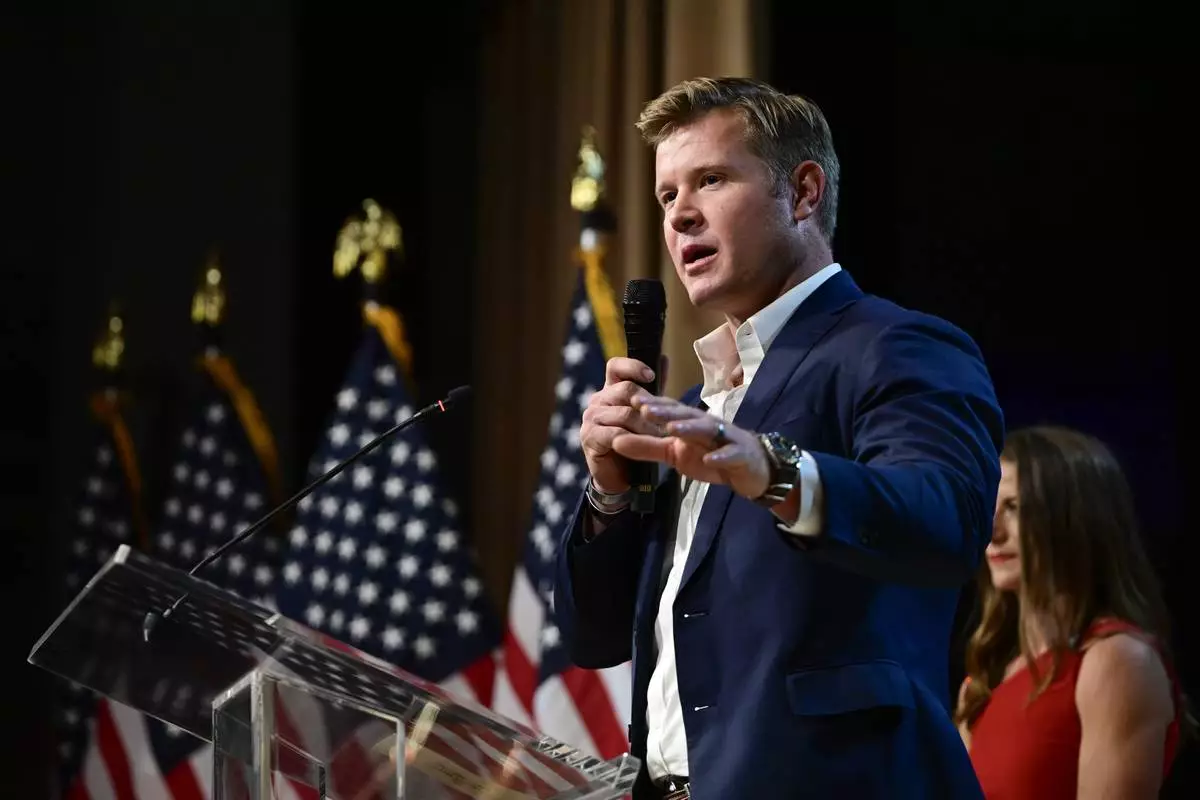
FILE - Republican Montana Senate candidate Tim Sheehy speaks during an election night watch party, Nov. 6, 2024, in Bozeman, Mont. (AP Photo/Tommy Martino, File)
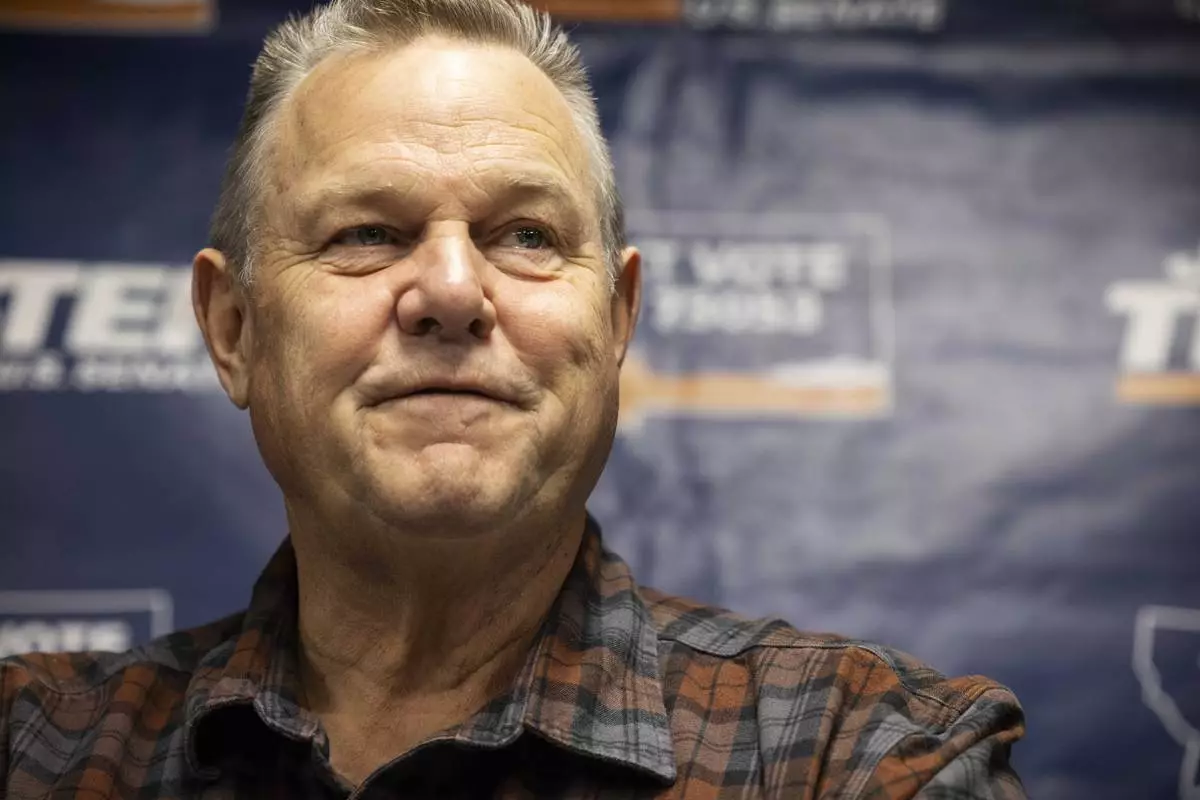
FILE - Democratic U.S. Sen. Jon Tester concedes the Montana Senate race to Republican Tim Sheehy in Great Falls, Mont., Nov. 6, 2024. (Thom Bridge/Independent Record via AP, File)
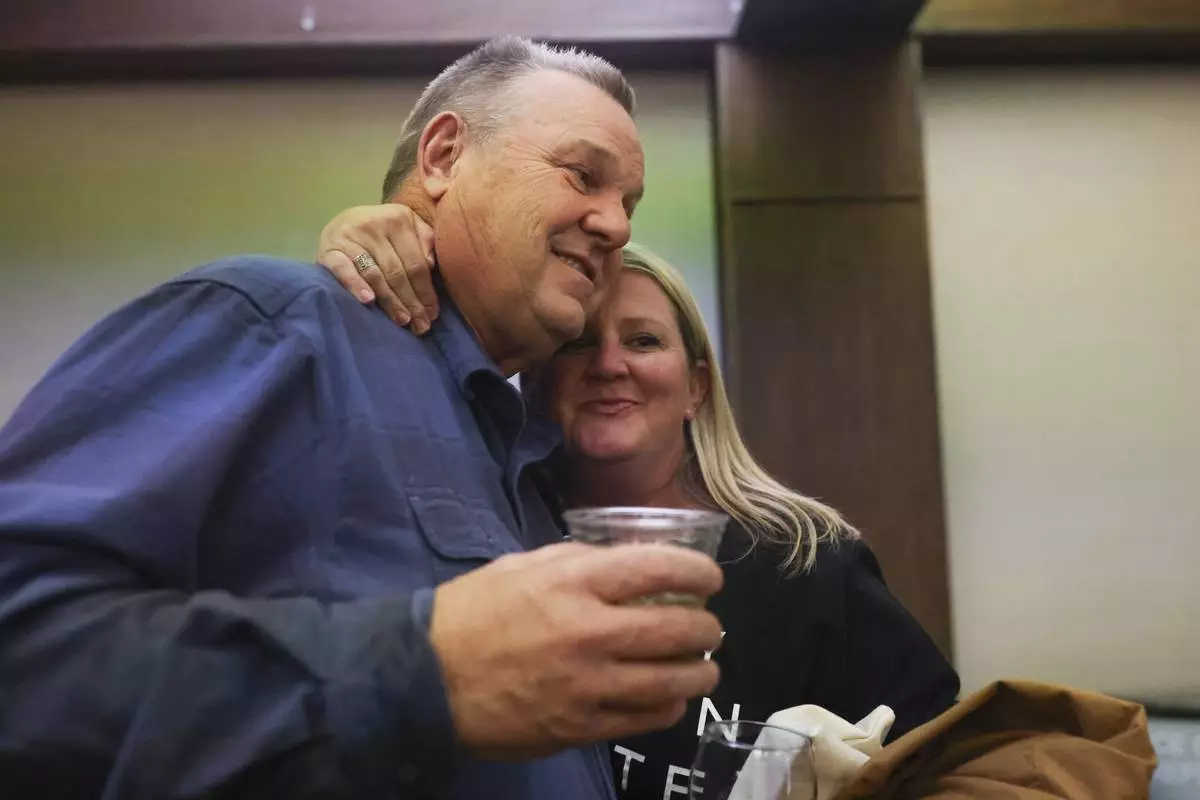
FILE - Sen. Jon Tester, D-Mont., left, receives a hug from supporter Brianne Laurin during an election night watch party, Nov. 5, 2024, in Great Falls, Mont. (AP Photo/Mike Clark, File)
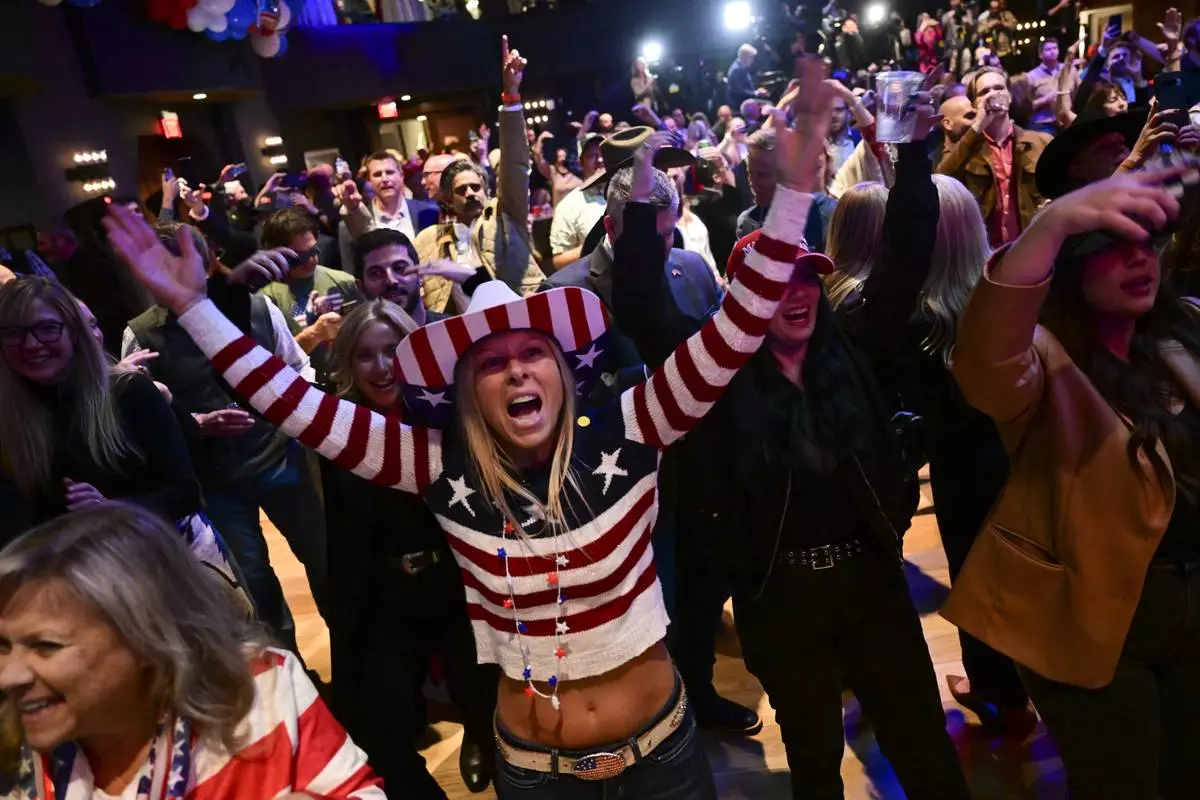
FILE - Supporters cheer at an election night watch party for Republican Montana Senate candidate Tim Sheehy, Nov. 6, 2024, in Bozeman, Mont. (AP Photo/Tommy Martino, File)























